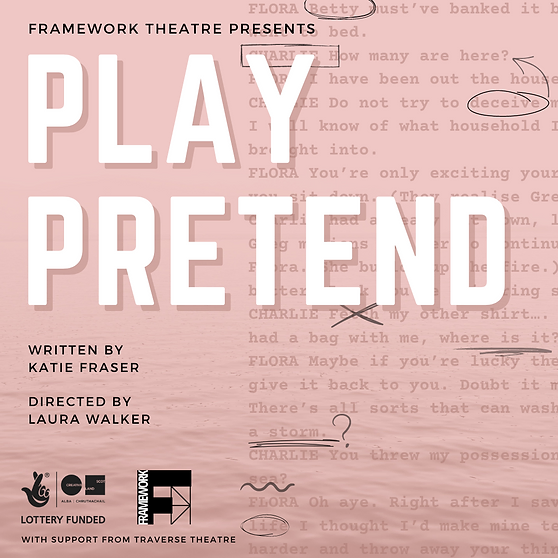Katie Fraser is one of the most exciting Scottish female playwrights emerging onto the theatre scene in recent years. Having completed the MSc in Playwriting program at the University of Edinburgh back in 2020, Fraser’s name has popped up onto several radars. She is currently under commission with Strange Town Theatre, has worked with both the Lyceum Youth theatre and Edinburgh Youth Theatre, and most recently will have her play Play Pretend on at the Traverse Theatre, presented by Framework Theatre Company and funded by Creative Scotland. I sat down with Katie to discuss her new play and the journey that has gotten her to this moment.
Katie, you’re a graduate of the masters in Playwriting course taught here at the University of Edinburgh – can you tell us a little bit about your experience while on the course and how that’s shaped your emerging playwriting career thus far?
Having the opportunity to take the playwriting course was invaluable. My life would look very different today if I had not taken it. I absolutely loved having a weekly workshop – hearing the way that my course mates wrote, across different subject matters, forms, and with such different voices – was enriching and exciting. The masterclasses and the weekly course readings also expanded my understanding and the language I had available to me to describe what I loved and was excited about in theatre and I learnt that hating something was probably more valuable to being indifferent. Whatever live theatre should do; it should make us feel.
Play Pretend was originally one of the plays you submitted for assessment while on the playwriting masters. What was your original inspiration for the play and how has it developed since you worked on that original draft in 2020?
In a recently published biography of Flora Macdonald, Flora Fraser wrote in the preface, “I cannot remember a time when I did not know the story of Flora Macdonald”. That resonates with me. But as much as I knew the figure of Flora Macdonald, I knew very little detail. I was drawn to the romantic myth of her role in Bonnie Prince Charlie’s escape. The more I read about her, the more I was thinking about how women have been written in history and the mythologizing of their role in it.
The play has developed a lot since 2020. I wasn’t satisfied with the play that I originally wrote, which focused solely on the historical characters and the events of Charlie’s escape to Skye. I felt that that draft didn’t offer the audience much to take away or ponder, so it felt like something was missing. I added in a meta-theatrical narrative and added two characters who were actors in a rehearsal room, using sections of the script that I had originally written as a standalone piece. I had fun distorting those original lines and playing up the melodrama in some sections.
What else do you think this meta theatricality added to the play?
From the discussions in the rehearsal room, it feels like the meta theatricality has built on the themes of power and patriarchy within the play. We started looking for moments where the layers of narrative started to ‘glitch through’ (a phrase that came up during the design meetings) and the points at which the narratives intersect with one another is hopefully going to draw parallels between the Amy/Greg [the 21st century characters] and Flora/Charlie characters [historical figures].
What drew you to the historical story of Prince Charlie’s escape to Skye n 1746? And what do you think we could still learn from that story?
It’s a much told and much romanticized story from Scottish history. Whether I try to or not, I often find myself writing about Scotland, so I turned to that particular moment. The more I read about it, the more intrigued I was to try and understand why a failed rising would form a part of the story of Scotland – is it because we like the idea of ourselves as a nation of rebels, but our pessimism romanticizes the idea of escape and failure? Patriotism is a dangerous and alluring concept and I think we should consider how it operates at the personal and the national level.
I was interested particularly in Flora and her motives in helping him. The story of Charlie’s escape goes some way to providing Flora with some agency. He couldn’t have done it without her help as he had to dress as her maid to pass undetected. Yet, what we know about Flora is through her association with Charlie. That led me to think about how we still talk about women in relation to the famous men that they are connected to.
What do you think reconceptualizing historical events for contemporary audiences allows us to do as theatre makers and theatregoers?
The questions that were asked of us regularly in the Playwriting course were, why this idea, why now? It’s been an interesting process to answer why I wanted to write about Flora Macdonald, and justify the time spent by an audience watching her story.
The play is about how we talk about women in history, and how we use those historical figures to justify how women are still treated today. For theatre makers a challenge may be to consider how we interrogate the rhetoric we use and what we accept as historical inevitabilities. For theatregoers, the opportunity comes from what you take away from the play, how you talk about it and how you evaluate your prejudices and beliefs afterwards.
I personally feel you rose to that challenge with this play.
That’s really kind, thank you so much!
Can you speak more about the process of getting Play Pretend produced? How did you and Framework Theatre Company start working together, how did you procure the funding, etc.?
I submitted the script to Framework in 2021 in response to a call out they had. I describe it now as one of the loveliest rejection emails I’ve ever had! The email said that as I had no one else attached to the project, it wasn’t quite right for that call out, but that the concept of the work resonated with Framework, and they were interested in supporting me further in the project’s development.
From there we had a digital R&D and the audience provided some feedback that helped me go away and redraft the play. In 2022 we applied for some funding for an in-person R&D and then earlier this year we applied for funding to put on a production which, luckily, we were successful in doing. We’ve been funded in this project by applying to Creative Scotland. Framework is an organization that support emerging and early-career artists, so they’ve been the perfect team to work with on this production.
What has been your favourite moment of the process so far?
Seeing elements of the production come to life has been surreal and so enjoyable. One of the moments I always wanted to get to with my plays is the point at which you hand it over and other people’s creativity take over, so hearing about ideas for the set and costume design was fascinating, or how it would relate to the lighting design. I went in during the first week of rehearsals to see images and post-its up on a wall, and it felt like things were really coming to life in a new way. And of course, seeing actors and a director play with words and bringing them to life is incredible.
If you had to describe Play Pretend in three words, what would they be?
Meta. Scottish. Feminist.
What advice would you give to other emerging playwrights? Any parting wisdom?
Find your community. The myth of a writer working in solitude may hold its appeal but if you’re interested in making theatre, interested in sharing your work, then it is great to have people that you can work with and share your ideas with. Having people in the same boat as you is great for morale and inspiration. Book tickets for one another’s plays, read each other’s early drafts, and talk about the things you love that are unrelated to theatre. It all helps.
Image provided via Framework Theatre Company Press Release.

